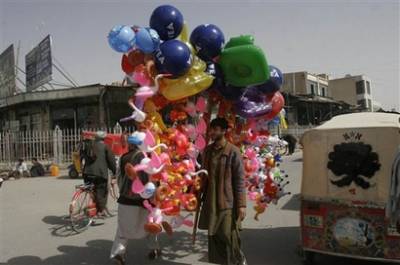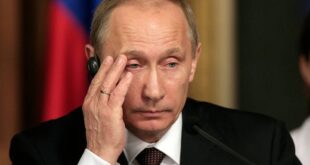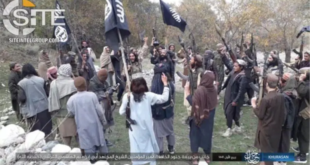 KABUL (Reuters) – Devastated by nearly three decades of war, Afghanistan‘s isolation from world trade and global finance might for once be to its advantage, shielding the country from the economic and financial meltdown abroad.
KABUL (Reuters) – Devastated by nearly three decades of war, Afghanistan‘s isolation from world trade and global finance might for once be to its advantage, shielding the country from the economic and financial meltdown abroad.
Sandwiched between Kabul’s main mosque and a foul-smelling river is the teeming money market where traders, holding aloft fist-fulls of U.S. dollars, euros, Pakistani rupees and afghanis, shout out their prices above the melee.
The afghani, Afghanistan’s currency, has barely skipped a beat and property prices in the capital and other major cities are still rising steadily despite hundreds of Taliban suicide bombings and an insurgency spreading from the south and east.
“(The recession) has not affected Afghanistan because we have no dealings with Asia, Europe or anywhere else,” said Amin Jan Khosti, the head of the market.
While other currencies rise and fall, the afghani has remained steady at around 52 to the dollar, the same as when the credit crunch began to bite last year.
That is partly due to the United States’ backing of Afghan Central Bank intervention which has kept the currency stable and protected the country’s economy from being buffeted by the financial turmoil, economists said.
The biggest risk for Afghanistan is that the foreign governments that pump billions of dollars in annual aid might need to cut back as they fund multi-billion dollar stimulus plans for their own economies in the wake of the economic crisis.
Experts say that Afghanistan has little to worry about, though, as its importance to the West is possibly greater than ever as the focus of the “war on terror” moves from Iraq to its territory, making aid cuts unlikely especially as such cuts might weaken the Afghan economy and strengthen the Taliban.
“The U.S. is deeply engaged here politically, militarily and economically. There are growing security problems and political instability to some extent, so America does not want to have or see another headache and it is keen to keep the economy stable,” said Sayed Masood, an economics professor at Kabul University.
U.S. President Barack Obama has called Afghanistan his top foreign policy priority and has vowed to focus on development projects in addition to expanding the NATO military presence as insurgent violence has increased to its highest levels since U.S.-led forces ousted the Taliban in 2001.
The September 11, 2001 attacks were hatched in Afghanistan by al Qaeda leader Osama bin Laden and top commanders who are believed to be hiding somewhere along the Afghanistan-Pakistan border.
PROPERTY BOOM
While most Afghans live in grinding poverty, with little running water, proper sewerage and sanitation, it is clear from the gaudy mansions springing up in the wealthier parts of the capital that some people are getting rich.
“In Afghanistan, many people do not know a lot about the world’s economic crisis involving housing. The property business has become a major trade here,” said Kabul University’s Masood.
“There is not much infrastructure or good security, so those who have money and live here invest in property,” he said.
That trend along with the steady flow of refugees returning from abroad and people fleeing fighting in the countryside has helped to push up Kabul property prices to record levels.
And because purchases are made in cash, the market is not affected by any squeeze in credit.
The development has created a big gap between the majority poor and minority rich which may lead to social unrest if not dealt with carefully, according to analysts.
A small residential plot in central Kabul now costs $35,000 on average, 25 percent more than 12 months ago, estate agents said. A similar sized plot in a business district of the city would cost more than $100,000, they said.
The Afghan economy has been kept afloat by the inflow of billions of dollars of aid, the spending and jobs provided by 69,500 foreign troops deployed in Afghanistan, as well as an illegal drugs trade worth an estimated $3 billion a year.
“The global financial crisis is unlikely to have major negative implications for Afghanistan,” said Mariam Sherman, the World Bank‘s country manager for Afghanistan.
“This is mainly because the formal financial sector in Afghanistan is small, does not play a major role in financing economic activity, and has very limited international exposure.”
Donor nations have spent more than $15 billion in Afghanistan since the Taliban‘s ouster, according to the Afghan government which relies on aid for 90 percent of its budget.
Yet as unemployment queues grow in donor countries, some politicians and members of the public are asking questions.
In Canada, sceptical opposition leaders are asking why, at a time of big budget deficits and soaring unemployment, is the Ottawa government pouring billions of dollars into a combat and aid mission critics say shows few signs of success.
European countries, similarly strapped for cash and with public opinion solidly against the war, could also face problems financing an Afghan government largely seen as corrupt and inept.
It is the United States that is Kabul’s biggest backer, spending more than half of its overseas development aid in Afghanistan and with plans to boost its 38,000 troops in the country by an additional 17,000.
If the financial crises deteriorates further in the U.S., where Obama is struggling to cut back a ballooning budget deficit, then some in Afghanistan are concerned foreign aid might be whittled down.
“Afghanistan is highly aid-dependent and if international developments start adversely affecting aid flows to Afghanistan that could be highly problematic,” said Sherman, the World Bank’s country manager for Afghanistan.
“However, given the country’s geopolitical importance, there are no signs or expectations at the present time that aid would decline.”
 Eurasia Press & News
Eurasia Press & News



